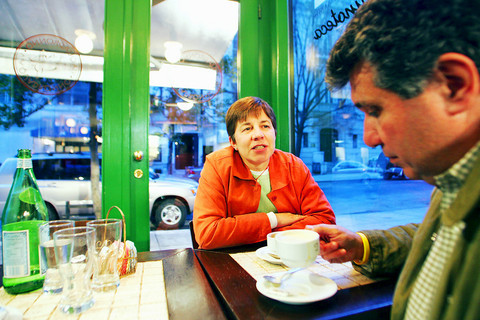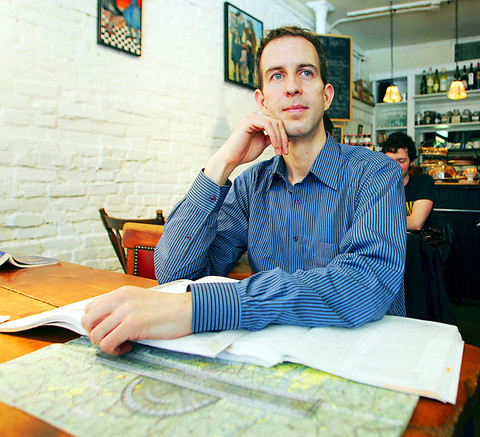New York is a city of professionals and predawn discipline, an empire meant to be conquered not by wanderers but by the lusty achievement of the hyperemployed. Languorous weekday afternoons are the province of those deemed to be lacking in power.
Still, a fair portion of the city's employable population can be found, midweek, far from any office, whiling away the hours in restaurants and cafes. Unlike the corps of freelance writers with their laptops, these loiterers do not appear to be engaged in any income-producing work. Call them flaneurs, if you want to romanticize them with a French name. Some are princes of leisure, who clearly have never learned that a bank account may approach zero. Others are conscientious objectors to the rat race, who have decided that their personal freedom is worth more than the compromises that might gain you a flat-screen TV.
All of them -- super rich, rich or merely upper middle class -- have somehow inoculated themselves against the fiscal anxiety that drives most unemployed people to try to get a job. And they have enough disposable income to afford the minimum entry (a cup of coffee) into one of the precious places that allows low-revenue loafing.

Scattered throughout this alternative ecosystem of cafes, these people off the city grid appear to be upstanding folks with open wallets and nice footwear. But who are they? Why are they not working? And how on earth can they afford those shoes?
Cipriani
The outside tables at Downtown Cipriani, on West Broadway in SoHo, were packed at 3:30pm on a Wednesday. Robert Dimin, an artist; Justin Melnick, a young entrepreneur; and Nicole Trunfio, a model, sat inside, around a bottle of Acqua Panna (US$9) and lemonades (US$5.50 each).

Dimin wore a black baseball cap with an orange Princeton "P" pulled low over his forehead. "It's the only time to come here," he said. "Weekdays, when everyone else is working."
Trunfio got up to leave, and Melnick walked her out. They stood by his black Vespa, which has custom black matte rims, racing tires and a pipe that makes it sound like a Harley.
"Tomorrow is my birthday," Dimin said. "I turn 25. That's old." He swore he had nothing fabulous planned, just a private party at Lotus.
"I view myself as a downtowner," said Dimin, who grew up on the Upper East Side but now lives in Princeton, New Jersey He said he had studied photography at Parsons but did not graduate. His fiancee, Elizabeth Kessler, is working toward a PhD in archeology at Princeton University, and he is not, at present, employed.
"I only want to make my own projects," he said. "I get yelled at every day by my family: `Get a job. Go work for The AP Use your skills.' I can't. I have to do it my way."
He was wearing a black Burberry pique shirt and striking orange Nikes. How could an idealist afford such stuff? "My US$150 Nikes that should have cost US$35?" Dimin said. "A lot of gifts. And my art sells for a lot of money."
Dimin's work, shown at CVZ Contemporary, includes photographs of nubile young women and an American flag fashioned of gray-and-blue fatigued cloth -- much like the material of Dimin's baggy shorts -- and stripes of the same thin Prada red that graces his beat-up wallet.
"I don't like money," Dimin insisted. "I'm not rich like a lot of people I know, like the Born Rich movie. That's an entirely different ballgame. I'm the poorest kid of the rich kids."
Melnick, 24, came back inside and put an NTB herbal cigarette in his mouth, but didn't light it. "I'm quitting," he said.
Melnick, who said he dropped out of the University of Denver to help open a restaurant, explained that he split his time among New York, Los Angeles and Paris, running a nightclub and restaurant consultancy. He is also developing a line of surfer clothing. "For me the most depressing thing would be to make US$10 million and have it be a Von Dutch," he said, referring to a popular clothing line.
He gazed at a photo of the 7.5m climbing wall at his old high school, the White Mountain School, in New Hampshire. "I wanted to expand the climbing program," he said. "So I raised the 15 grand it cost to build it." When pressed for details, Melnick explained, "The way my father looked at it was as a tax write-off." (School officials said that Melnick's father contributed US$9,000; they raised the rest.)
The bill for the lemonades, which numbered about 10, was left on the table unexamined. Melnick simply announced, "I'm buying."
Doma
Doma Cafe and Gallery, on Perry Street, was packed at 3pm on a Friday. Lee Bob Black, 31, moved through the place like a prince in his court. He seemed to know a quarter of the 20 people in the cafe.
He settled briefly by the window to discuss weekend plans with Edwin John Wintle, 43, a former lawyer and author of the coming memoir Breakfast With Tiffany. "I wrote a good portion of my first book here," said Wintle, who works part-time. "If I don't sell another book, I'll be poor in less than six months."
"I'm just an unpublished writer," Black said. "I made a bunch of money at Morgan Stanley, and I haven't worked in a year." He said his first literary effort had been rejected by 60 agents. He spent only US$1.63 on coffee that afternoon, and his black Skechers looked worn beyond their four months. "I don't have expensive tastes," he said.
Nearby, at a large wooden table, sat Brian Moore, 35. To look at him is to think "wage earner." Formerly a compensation analyst at Genentech in San Francisco, Moore had moved to New York seven months earlier to be with his fiancee, a resident at St. Vincent's Hospital.
Tired, he said, of PowerPoint and e-mail, he decided to study for a commercial pilot's license, and he spent most of the afternoon hunched over a training manual.
Waywardness does not sit easily. "It's a little unnerving," he said, referring to his slightly adrift afternoons. "I've tended to seek steady pay and security. Now I'm going off on an adventure. There are days when I think, `What am I doing?' Other days I think, `You only have one life to live."'
He's living, in part, off his Genentech stock, but he said he was at a point at which he had to differentiate needs from wants. A flat-panel television? Definitely a want.
A friend at an investment bank had offered to help find him a job at her company, Moore said, but he said he cannot conceive of it. "I'd have to get a US$10,000 signing bonus just for the wardrobe," he said.
Via Quadronno
The small tables at Via Quadronno were packed at 3:45pm on a Friday. Paolo Della Puppa, an owner of the restaurant, on East 73rd Street, sat in back, discoursing on the origins of the European cafe and the European coffee, a trajectory that touched on Turks, Yemenis and the Habsburg dynasty.
Della Puppa is Italian, and many of his patrons share his European roots. "American rich, you are a CEO, you have no time," he said. "Italian rich, they live like rich people. They go to work at noon. They enjoy life."
Via Quadronno is host to a rotating assortment of diplomats, guests of the nearby Carlyle hotel, private-school moms, members of the Agnelli family and the occasional teenager possessed of a black American Express card.
Yet Sue Ventura and her husband, Lou, are also regulars. Ventura, a student at the New York School of Interior Design, did not enter the world of the US$4 afternoon cappuccino until middle age. In 1994 -- in honor of her 40th birthday -- she quit her job as a bond trader after 15 years on Wall Street. "My liberation," she said, beaming. Her husband still works as a senior managing director at Bear Stearns, though he joins her there after work most days.
Now, instead of eating at her desk, she practices Italian with the staff at Via Quadronno. But stepping out of a life of hyperproductivity, she says, where one's value is as quantifiable as one's trading powers, was as unsettling as it was glorious.
She has reconciled herself to slowness. "Life is fleeting," she said. "You've got to step back every once in a while."

On April 26, The Lancet published a letter from two doctors at Taichung-based China Medical University Hospital (CMUH) warning that “Taiwan’s Health Care System is on the Brink of Collapse.” The authors said that “Years of policy inaction and mismanagement of resources have led to the National Health Insurance system operating under unsustainable conditions.” The pushback was immediate. Errors in the paper were quickly identified and publicized, to discredit the authors (the hospital apologized). CNA reported that CMUH said the letter described Taiwan in 2021 as having 62 nurses per 10,000 people, when the correct number was 78 nurses per 10,000

As we live longer, our risk of cognitive impairment is increasing. How can we delay the onset of symptoms? Do we have to give up every indulgence or can small changes make a difference? We asked neurologists for tips on how to keep our brains healthy for life. TAKE CARE OF YOUR HEALTH “All of the sensible things that apply to bodily health apply to brain health,” says Suzanne O’Sullivan, a consultant in neurology at the National Hospital for Neurology and Neurosurgery in London, and the author of The Age of Diagnosis. “When you’re 20, you can get away with absolute

May 5 to May 11 What started out as friction between Taiwanese students at Taichung First High School and a Japanese head cook escalated dramatically over the first two weeks of May 1927. It began on April 30 when the cook’s wife knew that lotus starch used in that night’s dinner had rat feces in it, but failed to inform staff until the meal was already prepared. The students believed that her silence was intentional, and filed a complaint. The school’s Japanese administrators sided with the cook’s family, dismissing the students as troublemakers and clamping down on their freedoms — with

As Donald Trump’s executive order in March led to the shuttering of Voice of America (VOA) — the global broadcaster whose roots date back to the fight against Nazi propaganda — he quickly attracted support from figures not used to aligning themselves with any US administration. Trump had ordered the US Agency for Global Media, the federal agency that funds VOA and other groups promoting independent journalism overseas, to be “eliminated to the maximum extent consistent with applicable law.” The decision suddenly halted programming in 49 languages to more than 425 million people. In Moscow, Margarita Simonyan, the hardline editor-in-chief of the